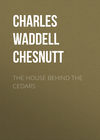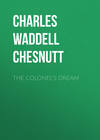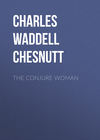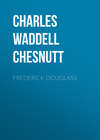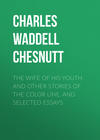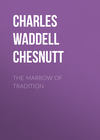Kitabı oku: «The House Behind the Cedars», sayfa 6
XII
TRYON GOES TO PATESVILLE
Tryon arrived in the early morning and put up at the Patesville Hotel, a very comfortable inn. After a bath, breakfast, and a visit to the barbershop, he inquired of the hotel clerk the way to the office of Dr. Green, his mother's cousin.
"On the corner, sir," answered the clerk, "by the market-house, just over the drugstore. The doctor drove past here only half an hour ago. You'll probably catch him in his office."
Tryon found the office without difficulty. He climbed the stair, but found no one in except a young colored man seated in the outer office, who rose promptly as Tryon entered.
"No, suh," replied the man to Tryon's question, "he ain't hyuh now. He's gone out to see a patient, suh, but he'll be back soon. Won't you set down in de private office an' wait fer 'im, suh?"
Tryon had not slept well during his journey, and felt somewhat fatigued. Through the open door of the next room he saw an inviting armchair, with a window at one side, and upon the other a table strewn with papers and magazines.
"Yes," he answered, "I'll wait."
He entered the private office, sank into the armchair, and looked out of the window upon the square below. The view was mildly interesting. The old brick market-house with the tower was quite picturesque. On a wagon-scale at one end the public weighmaster was weighing a load of hay. In the booths under the wide arches several old negro women were frying fish on little charcoal stoves—the odor would have been appetizing to one who had not breakfasted. On the shady side stood half a dozen two-wheeled carts, loaded with lightwood and drawn by diminutive steers, or superannuated army mules branded on the flank with the cabalistic letters "C. S. A.," which represented a vanished dream, or "U. S. A.," which, as any negro about the market-house would have borne witness, signified a very concrete fact. Now and then a lady or gentleman passed with leisurely step—no one ever hurried in Patesville—or some poor white sandhiller slouched listlessly along toward store or bar-room.
Tryon mechanically counted the slabs of gingerbread on the nearest market-stall, and calculated the cubical contents of several of the meagre loads of wood. Having exhausted the view, he turned to the table at his elbow and picked up a medical journal, in which he read first an account of a marvelous surgical operation. Turning the leaves idly, he came upon an article by a Southern writer, upon the perennial race problem that has vexed the country for a century. The writer maintained that owing to a special tendency of the negro blood, however diluted, to revert to the African type, any future amalgamation of the white and black races, which foolish and wicked Northern negrophiles predicted as the ultimate result of the new conditions confronting the South, would therefore be an ethnological impossibility; for the smallest trace of negro blood would inevitably drag down the superior race to the level of the inferior, and reduce the fair Southland, already devastated by the hand of the invader, to the frightful level of Hayti, the awful example of negro incapacity. To forefend their beloved land, now doubly sanctified by the blood of her devoted sons who had fallen in the struggle to maintain her liberties and preserve her property, it behooved every true Southron to stand firm against the abhorrent tide of radicalism, to maintain the supremacy and purity of his all-pervading, all-conquering race, and to resist by every available means the threatened domination of an inferior and degraded people, who were set to rule hereditary freemen ere they had themselves scarce ceased to be slaves.
When Tryon had finished the article, which seemed to him a well-considered argument, albeit a trifle bombastic, he threw the book upon the table. Finding the armchair wonderfully comfortable, and feeling the fatigue of his journey, he yielded to a drowsy impulse, leaned his head on the cushioned back of the chair, and fell asleep. According to the habit of youth, he dreamed, and pursuant to his own individual habit, he dreamed of Rena. They were walking in the moonlight, along the quiet road in front of her brother's house. The air was redolent with the perfume of flowers. His arm was around her waist. He had asked her if she loved him, and was awaiting her answer in tremulous but confident expectation. She opened her lips to speak. The sound that came from them seemed to be:—
"Is Dr. Green in? No? Ask him, when he comes back, please, to call at our house as soon as he can."
Tryon was in that state of somnolence in which one may dream and yet be aware that one is dreaming,—the state where one, during a dream, dreams that one pinches one's self to be sure that one is not dreaming. He was therefore aware of a ringing quality about the words he had just heard that did not comport with the shadowy converse of a dream—an incongruity in the remark, too, which marred the harmony of the vision. The shock was sufficient to disturb Tryon's slumber, and he struggled slowly back to consciousness. When fully awake, he thought he heard a light footfall descending the stairs.
"Was there some one here?" he inquired of the attendant in the outer office, who was visible through the open door.
"Yas, suh," replied the boy, "a young cullud 'oman wuz in jes' now, axin' fer de doctuh."
Tryon felt a momentary touch of annoyance that a negro woman should have intruded herself into his dream at its most interesting point. Nevertheless, the voice had been so real, his imagination had reproduced with such exactness the dulcet tones so dear to him, that he turned his head involuntarily and looked out of the window. He could just see the flutter of a woman's skirt disappearing around the corner.
A moment later the doctor came bustling in,—a plump, rosy man of fifty or more, with a frank, open countenance and an air of genial good nature. Such a doctor, Tryon fancied, ought to enjoy a wide popularity. His mere presence would suggest life and hope and healthfulness.
"My dear boy," exclaimed the doctor cordially, after Tryon had introduced himself, "I'm delighted to meet you—or any one of the old blood. Your mother and I were sweethearts, long ago, when we both wore pinafores, and went to see our grandfather at Christmas; and I met her more than once, and paid her more than one compliment, after she had grown to be a fine young woman. You're like her! too, but not quite so handsome—you've more of what I suppose to be the Tryon favor, though I never met your father. So one of old Duncan McSwayne's notes went so far as that? Well, well, I don't know where you won't find them. One of them turned up here the other day from New York.
"The man you want to see," he added later in the conversation, "is old Judge Straight. He's getting somewhat stiff in the joints, but he knows more law, and more about the McSwayne estate, than any other two lawyers in town. If anybody can collect your claim, Judge Straight can. I'll send my boy Dave over to his office. Dave," he called to his attendant, "run over to Judge Straight's office and see if he's there.
"There was a freshet here a few weeks ago," he want on, when the colored man had departed, "and they had to open the flood-gates and let the water out of the mill pond, for if the dam had broken, as it did twenty years ago, it would have washed the pillars from under the judge's office and let it down in the creek, and"—
"Jedge Straight ain't in de office jes' now, suh," reported the doctor's man Dave, from the head of the stairs.
"Did you ask when he'd be back?"
"No, suh, you didn't tell me ter, suh."
"Well, now, go back and inquire.
"The niggers," he explained to Tryon, "are getting mighty trifling since they've been freed. Before the war, that boy would have been around there and back before you could say Jack Robinson; now, the lazy rascal takes his time just like a white man."
Dave returned more promptly than from his first trip. "Jedge Straight's dere now, suh," he said. "He's done come in."
"I'll take you right around and introduce you," said the doctor, running on pleasantly, like a babbling brook. "I don't know whether the judge ever met your mother or not, but he knows a gentleman when he sees one, and will be glad to meet you and look after your affair. See to the patients, Dave, and say I'll be back shortly, and don't forget any messages left for me. Look sharp, now! You know your failing!"
They found Judge Straight in his office. He was seated by the rear window, and had fallen into a gentle doze—the air of Patesville was conducive to slumber. A visitor from some bustling city might have rubbed his eyes, on any but a market-day, and imagined the whole town asleep—that the people were somnambulists and did not know it. The judge, an old hand, roused himself so skillfully, at the sound of approaching footsteps, that his visitors could not guess but that he had been wide awake. He shook hands with the doctor, and acknowledged the introduction to Tryon with a rare old-fashioned courtesy, which the young man thought a very charming survival of the manners of a past and happier age.
"No," replied the judge, in answer to a question by Dr. Green, "I never met his mother; I was a generation ahead of her. I was at school with her father, however, fifty years ago—fifty years ago! No doubt that seems to you a long time, young gentleman?"
"It is a long time, sir," replied Tryon. "I must live more than twice as long as I have in order to cover it."
"A long time, and a troubled time," sighed the judge. "I could wish that I might see this unhappy land at peace with itself before I die. Things are in a sad tangle; I can't see the way out. But the worst enemy has been slain, in spite of us. We are well rid of slavery."
"But the negro we still have with us," remarked the doctor, "for here comes my man Dave. What is it, Dave?" he asked sharply, as the negro stuck his head in at the door.
"Doctuh Green," he said, "I fuhgot ter tell you, suh, dat dat young 'oman wuz at de office agin jes' befo' you come in, an' said fer you to go right down an' see her mammy ez soon ez you could."
"Ah, yes, and you've just remembered it! I'm afraid you're entirely too forgetful for a doctor's office. You forgot about old Mrs. Latimer, the other day, and when I got there she had almost choked to death. Now get back to the office, and remember, the next time you forget anything, I'll hire another boy; remember that! That boy's head," he remarked to his companions, after Dave had gone, "reminds me of nothing so much as a dried gourd, with a handful of cowpeas rattling around it, in lieu of gray matter. An old woman out in Redbank got a fishbone in her throat, the other day, and nearly choked to death before I got there. A white woman, sir, came very near losing her life because of a lazy, trifling negro!"
"I should think you would discharge him, sir," suggested Tryon.
"What would be the use?" rejoined the doctor. "All negroes are alike, except that now and then there's a pretty woman along the border-line. Take this patient of mine, for instance,—I'll call on her after dinner, her case is not serious,—thirty years ago she would have made any man turn his head to look at her. You know who I mean, don't you, judge?"
"Yes. I think so," said the judge promptly. "I've transacted a little business for her now and then."
"I don't know whether you've seen the daughter or not—I'm sure you haven't for the past year or so, for she's been away. But she's in town now, and, by Jove, the girl is really beautiful. And I'm a judge of beauty. Do you remember my wife thirty years ago, judge?"
"She was a very handsome woman, Ed," replied the other judicially. "If I had been twenty years younger, I should have cut you out."
"You mean you would have tried. But as I was saying, this girl is a beauty; I reckon we might guess where she got some of it, eh, Judge? Human nature is human nature, but it's a d—d shame that a man should beget a child like that and leave it to live the life open for a negro. If she had been born white, the young fellows would be tumbling over one another to get her. Her mother would have to look after her pretty closely as things are, if she stayed here; but she disappeared mysteriously a year or two ago, and has been at the North, I'm told, passing for white. She'll probably marry a Yankee; he won't know any better, and it will serve him right—she's only too white for them. She has a very striking figure, something on the Greek order, stately and slow-moving. She has the manners of a lady, too—a beautiful woman, if she is a nigger!"
"I quite agree with you, Ed," remarked the judge dryly, "that the mother had better look closely after the daughter."
"Ah, no, judge," replied the other, with a flattered smile, "my admiration for beauty is purely abstract. Twenty-five years ago, when I was younger"—
"When you were young," corrected the judge.
"When you and I were younger," continued the doctor ingeniously,—"twenty-five years ago, I could not have answered for myself. But I would advise the girl to stay at the North, if she can. She's certainly out of place around here."
Tryon found the subject a little tiresome, and the doctor's enthusiasm not at all contagious. He could not possibly have been interested in a colored girl, under any circumstances, and he was engaged to be married to the most beautiful white woman on earth. To mention a negro woman in the same room where he was thinking of Rena seemed little short of profanation. His friend the doctor was a jovial fellow, but it was surely doubtful taste to refer to his wife in such a conversation. He was very glad when the doctor dropped the subject and permitted him to go more into detail about the matter which formed his business in Patesville. He took out of his pocket the papers concerning the McSwayne claim and laid them on the judge's desk.
"You'll find everything there, sir,—the note, the contract, and some correspondence that will give you the hang of the thing. Will you be able to look over them to-day? I should like," he added a little nervously, "to go back to-morrow."
"What!" exclaimed Dr. Green vivaciously, "insult our town by staying only one day? It won't be long enough to get acquainted with our young ladies. Patesville girls are famous for their beauty. But perhaps there's a loadstone in South Carolina to draw you back? Ah, you change color! To my mind there's nothing finer than the ingenuous blush of youth. But we'll spare you if you'll answer one question—is it serious?"
"I'm to be married in two weeks, sir," answered Tryon. The statement sounded very pleasant, in spite of the slight embarrassment caused by the inquiry.
"Good boy!" rejoined the doctor, taking his arm familiarly—they were both standing now. "You ought to have married a Patesville girl, but you people down towards the eastern counties seldom come this way, and we are evidently too late to catch you."
"I'll look your papers over this morning," said the judge, "and when I come from dinner will stop at the court house and examine the records and see whether there's anything we can get hold of. If you'll drop in around three or four o'clock, I may be able to give you an opinion."
"Now, George," exclaimed the doctor, "we'll go back to the office for a spell, and then I'll take you home with me to luncheon."
Tryon hesitated.
"Oh, you must come! Mrs. Green would never forgive me if I didn't bring you. Strangers are rare birds in our society, and when they come we make them welcome. Our enemies may overturn our institutions, and try to put the bottom rail on top, but they cannot destroy our Southern hospitality. There are so many carpet-baggers and other social vermin creeping into the South, with the Yankees trying to force the niggers on us, that it's a genuine pleasure to get acquainted with another real Southern gentleman, whom one can invite into one's house without fear of contamination, and before whom one can express his feelings freely and be sure of perfect sympathy."
XIII
AN INJUDICIOUS PAYMENT
When Judge Straight's visitors had departed, he took up the papers which had been laid loosely on the table as they were taken out of Tryon's breast-pocket, and commenced their perusal. There was a note for five hundred dollars, many years overdue, but not yet outlawed by lapse of time; a contract covering the transaction out of which the note had grown; and several letters and copies of letters modifying the terms of the contract. The judge had glanced over most of the papers, and was getting well into the merits of the case, when he unfolded a letter which read as follows:—
MY DEAREST GEORGE,—I am going away for about a week, to visit the bedside of an old friend, who is very ill, and may not live. Do not be alarmed about me, for I shall very likely be back by the time you are.
Yours lovingly,
ROWENA WARWICK.
The judge was unable to connect this letter with the transaction which formed the subject of his examination. Age had dimmed his perceptions somewhat, and it was not until he had finished the letter, and read it over again, and noted the signature at the bottom a second time, that he perceived that the writing was in a woman's hand, that the ink was comparatively fresh, and that the letter was dated only a couple of days before. While he still held the sheet in his hand, it dawned upon him slowly that he held also one of the links in a chain of possible tragedy which he himself, he became uncomfortably aware, had had a hand in forging.
"It is the Walden woman's daughter, as sure as fate! Her name is Rena. Her brother goes by the name of Warwick. She has come to visit her sick mother. My young client, Green's relation, is her lover—is engaged to marry her—is in town, and is likely to meet her!"
The judge was so absorbed in the situation thus suggested that he laid the papers down and pondered for a moment the curious problem involved. He was quite aware that two races had not dwelt together, side by side, for nearly three hundred years, without mingling their blood in greater or less degree; he was old enough, and had seen curious things enough, to know that in this mingling the current had not always flowed in one direction. Certain old decisions with which he was familiar; old scandals that had crept along obscure channels; old facts that had come to the knowledge of an old practitioner, who held in the hollow of his hand the honor of more than one family, made him know that there was dark blood among the white people—not a great deal, and that very much diluted, and, so long as it was sedulously concealed or vigorously denied, or lost in the mists of tradition, or ascribed to a foreign or an aboriginal strain, having no perceptible effect upon the racial type.
Such people were, for the most part, merely on the ragged edge of the white world, seldom rising above the level of overseers, or slave-catchers, or sheriff's officers, who could usually be relied upon to resent the drop of black blood that tainted them, and with the zeal of the proselyte to visit their hatred of it upon the unfortunate blacks that fell into their hands. One curse of negro slavery was, and one part of its baleful heritage is, that it poisoned the fountains of human sympathy. Under a system where men might sell their own children without social reprobation or loss of prestige, it was not surprising that some of them should hate their distant cousins. There were not in Patesville half a dozen persons capable of thinking Judge Straight's thoughts upon the question before him, and perhaps not another who would have adopted the course he now pursued toward this anomalous family in the house behind the cedars.
"Well, here we are again, as the clown in the circus remarks," murmured the judge. "Ten years ago, in a moment of sentimental weakness and of quixotic loyalty to the memory of an old friend,—who, by the way, had not cared enough for his own children to take them away from the South, as he might have done, or to provide for them handsomely, as he perhaps meant to do,—I violated the traditions of my class and stepped from the beaten path to help the misbegotten son of my old friend out of the slough of despond, in which he had learned, in some strange way, that he was floundering. Ten years later, the ghost of my good deed returns to haunt me, and makes me doubt whether I have wrought more evil than good. I wonder," he mused, "if he will find her out?"
The judge was a man of imagination; he had read many books and had personally outlived some prejudices. He let his mind run on the various phases of the situation.
"If he found her out, would he by any possibility marry her?"
"It is not likely," he answered himself. "If he made the discovery here, the facts would probably leak out in the town. It is something that a man might do in secret, but only a hero or a fool would do openly."
The judge sighed as he contemplated another possibility. He had lived for seventy years under the old regime. The young man was a gentleman—so had been the girl's father. Conditions were changed, but human nature was the same. Would the young man's love turn to disgust and repulsion, or would it merely sink from the level of worship to that of desire? Would the girl, denied marriage, accept anything less? Her mother had,—but conditions were changed. Yes, conditions were changed, so far as the girl was concerned; there was a possible future for her under the new order of things; but white people had not changed their opinion of the negroes, except for the worse. The general belief was that they were just as inferior as before, and had, moreover, been spoiled by a disgusting assumption of equality, driven into their thick skulls by Yankee malignity bent upon humiliating a proud though vanquished foe.
If the judge had had sons and daughters of his own, he might not have done what he now proceeded to do. But the old man's attitude toward society was chiefly that of an observer, and the narrow stream of sentiment left in his heart chose to flow toward the weaker party in this unequal conflict,—a young woman fighting for love and opportunity against the ranked forces of society, against immemorial tradition, against pride of family and of race.
"It may be the unwisest thing I ever did," he said to himself, turning to his desk and taking up a quill pen, "and may result in more harm than good; but I was always from childhood in sympathy with the under dog. There is certainly as much reason in my helping the girl as the boy, for being a woman, she is less able to help herself."
He dipped his pen into the ink and wrote the following lines:—
MADAM,—If you value your daughter's happiness, keep her at home for the next day or two.
This note he dried by sprinkling it with sand from a box near at hand, signed with his own name, and, with a fine courtesy, addressed to "Mrs. Molly Walden." Having first carefully sealed it in an envelope, he stepped to the open door, and spied, playing marbles on the street near by, a group of negro boys, one of whom the judge called by name.
"Here, Billy," he said, handing the boy the note, "take this to Mis' Molly Walden. Do you know where she lives—down on Front Street, in the house behind the cedars?"
"Yas, suh, I knows de place."
"Make haste, now. When you come back and tell me what she says, I'll give you ten cents. On second thoughts, I shall be gone to lunch, so here's your money," he added, handing the lad the bit of soiled paper by which the United States government acknowledged its indebtedness to the bearer in the sum of ten cents.
Just here, however, the judge made his mistake. Very few mortals can spare the spring of hope, the motive force of expectation. The boy kept the note in his hand, winked at his companions, who had gathered as near as their awe of the judge would permit, and started down the street. As soon as the judge had disappeared, Billy beckoned to his friends, who speedily overtook him. When the party turned the corner of Front Street and were safely out of sight of Judge Straight's office, the capitalist entered the grocery store and invested his unearned increment in gingerbread. When the ensuing saturnalia was over, Billy finished the game of marbles which the judge had interrupted, and then set out to execute his commission. He had nearly reached his objective point when he met upon the street a young white lady, whom he did not know, and for whom, the path being narrow at that point, he stepped out into the gutter. He reached the house behind the cedars, went round to the back door, and handed the envelope to Mis' Molly, who was seated on the rear piazza, propped up by pillows in a comfortable rocking-chair.
"Laws-a-massy!" she exclaimed weakly, "what is it?"
"It's a lettuh, ma'm," answered the boy, whose expanding nostrils had caught a pleasant odor from the kitchen, and who was therefore in no hurry to go away.
"Who's it fur?" she asked.
"It's fuh you, ma'm," replied the lad.
"An' who's it from?" she inquired, turning the envelope over and over, and examining it with the impotent curiosity of one who cannot read.
"F'm ole Jedge Straight, ma'm. He tole me ter fetch it ter you. Is you got a roasted 'tater you could gimme, ma'm?"
"Shorely, chile. I'll have Aunt Zilphy fetch you a piece of 'tater pone, if you'll hol' on a minute."
She called to Aunt Zilphy, who soon came hobbling out of the kitchen with a large square of the delicacy,—a flat cake made of mashed sweet potatoes, mixed with beaten eggs, sweetened and flavored to suit the taste, and baked in a Dutch oven upon the open hearth.
The boy took the gratuity, thanked her, and turned to go. Mis' Molly was still scanning the superscription of the letter. "I wonder," she murmured, "what old Judge Straight can be writin' to me about. Oh, boy!"
"Yas 'm," answered the messenger, looking back.
"Can you read writin'?"
"No 'm."
"All right. Never mind."
She laid the letter carefully on the chimney-piece of the kitchen. "I reckon it's somethin' mo' 'bout the taxes," she thought, "or maybe somebody wants to buy one er my lots. Rena'll be back terreckly, an' she kin read it an' find out. I'm glad my child'en have be'n to school. They never could have got where they are now if they hadn't."
